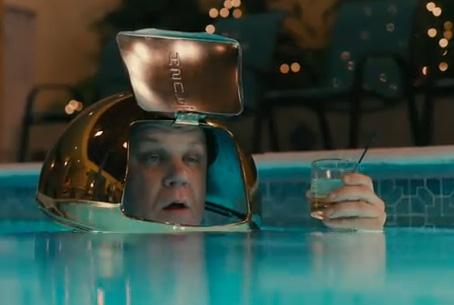 Comedies that have been made since, let's say the 90s, have been strongly derived from science fiction. It seems odd to think that the people who were raised on "Star Wars" and "Star Trek" went on to make "Clerks" and "Knocked Up." I never really connected the dots until I watched "Paul." Sci-fi, in either the best or worst sense, can also be comedy.
Comedies that have been made since, let's say the 90s, have been strongly derived from science fiction. It seems odd to think that the people who were raised on "Star Wars" and "Star Trek" went on to make "Clerks" and "Knocked Up." I never really connected the dots until I watched "Paul." Sci-fi, in either the best or worst sense, can also be comedy. "Paul" is one of those satires that's a little mocking, yet very loving, at the same time. Only someone so in love with sci-fi and comic book culture could ever make fun of it in this way. "Paul" is one of those movies that was much better than it had any right to be, or at least much better then I ever thought it would be.
"Paul" begins in a place where the new heroes of the 21st century seem to dwell: Comic-Con. Best friends Graeme (Simon Pegg) and Clive (Nick Frost) come all the way from England to experience the convention. On the way back, they stop off at some alien landing sites and come across Paul (Seth Rogen), a foul-mouthed, weed smoking alien who just wants to go back home. Now, the duo must help Paul safely meet his ship, while avoiding some very sinister FBI agents (including an intentionally robotic Jason Bateman, along with the much more ridiculous Bill Hader and Joe Lo Truglio). Along the way they also pick up a Jesus freak (Kristen Wiig) and flee her psychotic father (John Carroll Lynch).

"Paul" might not land my 10 best list for the year, but I will say that it's probably the best put together comedy I've seen so far this year (though the competition is pretty slim). Though this shouldn't be surprising, based on the people involved. Pegg and Frost have already gracefully mocked zombie movies with "Shaun of the Dead" and action movies with "Hot Fuzz." In both cases, they wrote movies that both mocked the genres while becoming entries into them. "Paul" is no exception. These people have obviously partaken in enough sci-fi to know how to make fun of it correctly.
"Paul" has such a sprawling cast of comedic talent, and each actor contributes exactly the way they should be. Pegg and Frost have been practicing British bromance for close to a decade now, and they really know how to do it right. Though this time, their relationship had a much difference balance. It was a little less of one actually trying to get things done, and the other being a total idiot. This time, their friendship was basically played up as a romance, with hilarious effect.
The best comedic minds in Britain blend with America's funniest comedians in "Paul." I guess someone who can make characters as awkward as Wiig can was destined to one day play a half blind hard-core Christian; I guess she fulfilled her destiny. Rogen meanwhile is good as ever, even in alien form. At times, Paul never seemed very alien, because no one bothered to make his character any different from the real Seth Rogen. This actually turns out to be a good thing, as Paul becomes a likable, almost human character. He's like E.T., if only E.T. could speak fluent English and chain smoke.
"Paul" nailed all of its sci-fi and pop culture references, from the never-ending mothership to the meeting spot at Devil's Tower. The film is directed by Greg Motolla, who impresses more and more with the range of comedies he can direct. He can go from gross out ("Superbad"), to a little dramatic ("Adventureland"), to one that has an FX alien as a main character.

What Motolla does best is make sappy ideas seem very sweet. Think about the power of the friendship in "Superbad." That's why I really wish "Paul" had a little more emphasis on the friendship between Graeme and Clive, because very little development and change occurs in it throughout the film. This is too bad, as this was always a strong and hilarious aspect in the other films Pegg and Frost made together. Nothing against Motolla, but perhaps frequent collaborator Edgar Wright would've been a good directorial choice here.
Then again, how do you fit a fully developed buddy comedy into a movie about a half naked alien? If Motolla, Pegg, and Frost could've pulled that off, they'd forever be comic geniuses. Maybe they didn't get there, but they still made a perfectly acceptable, unstoppably hilarious satire. They have certainly followed this rule of good satire quite well: if you want to make a good satire (especially of pop culture), you must be both familiar, and a little in love, with the content you are making fun of.








.jpg)



